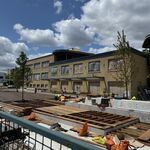Just how effective have new investments in transit been in promoting a shift of Americans towards public transportation? Has the recent livable communities movement resulted in increased commuting by bike or by foot?
The Census’ American Community Survey, released at the end of last month with the most recent 2009 data, provides a glimpse of what can change over nine years. These data are approximations in advance of the much bigger (and more accurate) sample set that is Census 2010, whose results will be released next year. The information detailed here applies to commutes only, not all trips.
By looking at America’s 30 largest cities — from New York to Portland — we can get some idea of how people are choosing to get to work, and how patterns are changing based on the availability of alternative transportation modes. I have chosen not to analyze metropolitan regions as a whole because I want to focus on the effects of improvements to transit systems and increasing walkability, two characteristics common to center cities but not necessarily to their suburbs. This biases the information, especially for places like Washington or Boston, where the central city represents a relatively small percentage of the overall regional population.
Nevertheless, the data demonstrate a number of interesting trends. Most notable are the huge declines in carpooling and large increases in biking noted over the largest cities. As the chart below shows, over the past nine years, carpooling’s mode share decreased on average by 25.9% and biking’s share increased by 58.5% (note that these are percent changes, not point changes, which are documented in a chart at the bottom of this article). The declines in carpooling were matched with a slight uptick in single-person driving, a 1.5% increase, and a decrease in transit share of 6.4%. These mode shares are not the same as total modal use; it is possible for transit ridership to increase even as modal share goes down (for instance, if city population increases), and vice-verse.
Overall, the percentage of people commuting by automobile declined by 3.4%, and the mode share of those using non-automobile modes decreased by 2.0%. It was possible for both to decline because of an increase in people not traveling to work at all but telecommuting.
Though these numbers show little change in use for automobile and transit overall, they do provide some clue as to the effects of rail investments. When comparing cities that have no rail lines with those that have existing lines or have invested in new ones, a correlation between rail and transit use is apparent. Cities with no rail saw far smaller declines in automobile mode shares than their rail counterparts; they also saw declining non-automobile mode shares, compared to increases in the rail cities. These differences were especially considerable when considering rail cities outside of Texas; excluding them, transit saw no mode share change, whereas single-person commuting by car decreased (albeit by a minuscule amount).
This may indicate that rail lines can play an important role in encouraging the population to try modes other than the automobile. The non-automobile mode share, which includes transit, biking, and walking, is particularly interesting from this perspective because it may reflect the number of people choosing to live in areas where it is acceptable to use transportation other than the private car. Is this conclusive evidence that rail works better than bus service to encourage people out of their cars? Not necessarily, but it’s certainly a part of the overall equation.
Looking city-by-city, modal share changes reflect some overall trends. Automobile usage continues to decrease in the nation’s older, densely developed cities: The places recording the largest declines in overall car share were, in order, Washington, New York, Boston, San Francisco, Seattle, Portland, and Chicago. Those with the largest declines in non-automobile share were largely sprawling cities, including, in order, Columbus, Houston, Dallas, Fort Worth, Las Vegas, and Nashville.
The places recording the largest increases in transit modal share were Nashville, Washington, Austin, Seattle, Los Angeles, Charlotte, and Boston. All but Austin, Boston, and Nashville have spent hundreds of millions of dollars investing in expanded rail transit systems; Boston already has a large one. Portland, unsurprisingly because of its municipal investment decisions, had the largest modal increase in bike usage, but other cities less known for biking like Baltimore, Detroit, Philadelphia, and Chicago also saw significant increases as well.
How can we explain the significant public transportation mode share declines in Houston and Dallas, two cities that invested considerably in their respective rail transit systems? Both saw increases in ridership of their transit systems between 2000 and 2008: Houston saw a 1.05% increase, Dallas a 11.7% jump. Those increases, however, were entirely lost by 2010, which has been a terrible year for transit in the two cities. At the same time, their city populations increased by 15.7% and 9.3%, respectively; transit improvements couldn’t keep up. This may be because of poor choices in public transportation investments or de-densification in the urban cores of these cities (or annexation, spreading the population out), but either way these are not model cities for transit investments.
I’ll conclude with the below table, which documents mode share in 2009 in the biggest cities of the United States. As the chart shows, automobiles have a majority share in all cities except New York, Boston, Washington, and San Francisco. Unsurprisingly, these are dense cities and the places in the United States with the most complete transit systems.
Louisville, the nation’s 29th-largest city, is not included here because it merged with the surrounding county, significantly changing demographics, in 2003. I have calculated “averages†not in terms of total trips, but city-by-city; thus modal share in Portland is considered just as important as that in New York, despite the latter being much bigger. Note city classification in the first table based on changes during the 2000-2009 period:
* No Rail: Austin, Columbus, Detroit, El Paso, Fort Worth, Indianapolis, Jacksonville, Las Vegas, Memphis*, Milwaukee, Nashville*, San Antonio.
* No new significant rail investments: Baltimore, Boston, Philadelphia*.
* New significant rail investments: Charlotte, Chicago, Dallas, Denver, Houston, Los Angeles, New York, Phoenix, Portland, San Diego, San Francisco, San Jose, Seattle, Washington.
* The minimal nature of Nashville’s Music City Star means I won’t include it as a “significant†rail investment here. Nor will I include streetcar projects in such cities as Memphis and Philadelphia.






